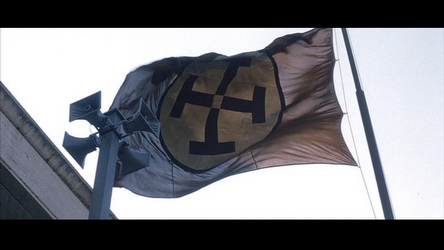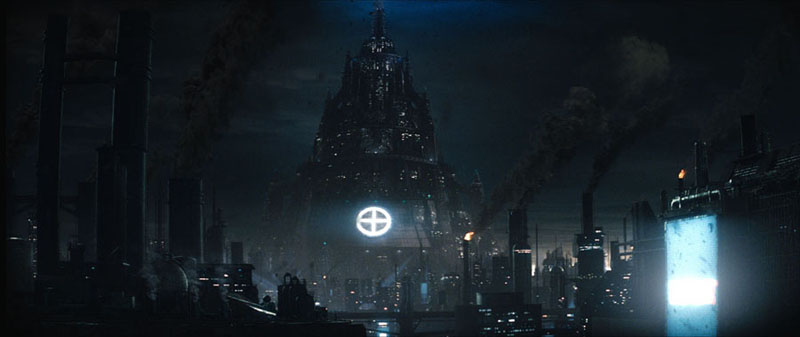‘To Go Against The Church Is To Go Against God’
You may recognize the above quote from the movie Priest, a dystopian action/horror film based on a Korean comic book. It wasn’t a particularly good film (or very successful financially) but it was fun and had a very distinct visual style. To summarize: in an alternate world, vampires have always been at war with humanity. The vampires of this world are not sparkly, lovestruck teens, nor are they black-coated, gun-wielding acrobats. They’re blind monsters, basically bloodthirsty animals. Humans crowd together in massive cities while the rest of the world goes to waste. The Church protects the frightened hordes, and “priests” – mercenaries with super-human killing abilities – are dispatched to eradicate the vampire scourge. Most vampires are slaughtered and the remaining survivors are herded onto reservations like Native Americans in the 19th century.
Apart from the grim tone and fierce violence that pushed the film’s PG-13 rating, one thing that struck me was the heavy religious symbolism. The Church functions as a sort of Nazi reich, with propaganda videos played on endless loops, stark, sturdy architecture, and the constant reminder that “to go against the Church is to go against God.” There are even automated confessionals that offer little solace for the aimless priest protagonist. He feels that his faith is slipping, especially when evidence of a vampire rampage comes to light but the Church turns a blind eye, refusing to acknowledge any threat for fear of stirring up dissent among the masses.
All of this reminds me of another bullet-riddled dystopian action bonanza – Equilibrium. I am proud to say that I am one of the few people I know who saw that movie in theaters when it was released in 2003 to little box office fanfare but it since gained a strong cult following. In that movie, “clerics” have the job of hunting down “sense offenders,” people who refuse to take emotion-numbing injections and hoard art and music, which is forbidden under the new regime. The flag of the government looks like a cross between a swastika and a cross, the unseen leader is known as “Father,” and the conflicted cleric at the center of the story is repeatedly reminded to show his “faith.”
It’s no surprise that Hollywood substitutes heavy-handed religion for Big Brother. History is full of real-life examples where religion stifles the populace, and we can even see it today in places in the Middle East and Africa. When I talk about church with my unbelieving friends, they often decry the church’s rules and regulations, saying that they’re good enough without them. And they’re right. The church shouldn’t be about rules, at least as far as attaining salvation goes. Isaiah 64:6 tells us that our most righteous deeds are like filthy rags to our holy Creator, and the rules that we do adhere to are for the edification of others and as a witness to the world.
Yet that’s not what people see when they’re on the outside looking in. They see the equivalent of pious fascism, stone-faced deacons and churchgoers ready to condemn at a moment’s notice. In Hollywood, the church is the ultimate “no-fun zone.” Cold, calculating, powerful, vigilant, a wet blanket on anything pleasurable. An institution to be rebelled against.
Now, it is obvious that Hollywood’s perception of the church leans more towards Catholicism, but Protestant denominations fare no better. Have you seen Kingsman: The Secret Service? I got the feeling that Colin Firth’s mind-controlled bloodbath inside a backwoods country church was filmed with particular glee and revelry.
I don’t expect Hollywood to change its tone, because a warm, welcoming church on the big screen wouldn’t be very interesting. In fact, movies like Priest and Equilibrium can be used to easily open up discussions about the church and how people perceive it. We don’t need to change Hollywood’s mind, just the minds of those watching.







































Oh I love this! I didn’t see Priest but I saw Equilibrium and Kingsmen. I noticed the correlation as well.
I think the reason is because we focus on ‘acting’ good instead of ‘being’ good…which is ultimately is a state of the heart and not our actions. Of course, the actions can be seen where as the state of the heart cannot be seen by human eyes but when the actions don’t mesh up with the way we perceive the heart should, makes great story-telling, name calling, and other acts of Hey, you’re a hypocrite.
Everyone on the outside of something often has incorrect opinions. I think as the Church, we need to go out of our way to combat this stodgy, grim image that is many people’s default perception.